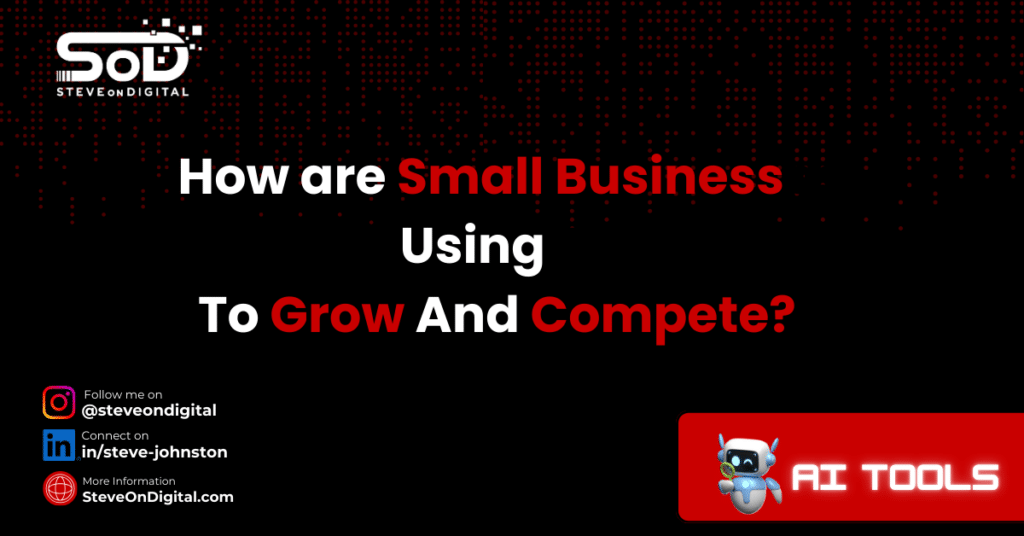How Are Small Businesses Using AI To Grow And Compete? | The Ultimate Guide

Small businesses are using AI to streamline operations, enhance customer interactions, and drive growth. AI tools help with tasks like managing inventory, personalizing marketing campaigns, and automating customer service, making it easier for small business owners to compete with larger companies. In my own experience, AI has been invaluable for saving time and reducing costs. Whether it’s through data analysis to make informed decisions or using AI-powered tools to optimize daily tasks, AI is transforming how small businesses like mine operate. As more small businesses adopt AI, its impact on efficiency and customer satisfaction continues to grow. I’m Steve, a digital transformation expert with a strong background in electrical engineering, an MBA, and a master’s in Project Management. I excel at helping SMEs navigate the digital landscape with practical insights. Let’s begin! The Role of AI in Transforming Business Operations AI is reshaping the way small businesses operate daily. It’s no longer about manually handling every task; AI is stepping in to take care of the repetitive tasks, allowing me and other small business owners to focus on more strategic aspects of our businesses. Let me share how AI has transformed some key areas of my operations. Streamlining Inventory Management With AI Tools One of the biggest challenges I’ve faced as a small business owner is managing inventory. Before adopting AI tools, it was a constant struggle to predict demand accurately, leading to either overstock or stockouts. But with AI-powered tools, I can now analyze historical data and market trends to predict demand more accurately. For example, AI algorithms can forecast which products will be in demand during specific seasons, helping me optimize my inventory levels and reduce excess stock. This not only saves money but also ensures that I can meet customer demand without delays. Enhancing Employee Productivity Through AI Employee productivity is another area where AI has made a significant impact. In the past, my team spent countless hours on repetitive tasks like data entry, scheduling, and basic customer interactions. With AI, many of these tasks are now automated, freeing up time for my employees to focus on more critical thinking and innovation. For example, AI-driven tools like chatbots can handle basic customer inquiries, while AI-based scheduling software manages appointments and task assignments. This not only boosts productivity but also improves employee satisfaction, as they can now focus on more engaging and meaningful work. Incorporating AI in Scheduling and Task Management Effective time management is crucial for any small business, and AI has been a lifesaver in this regard. I’ve incorporated AI tools that assist in scheduling tasks and managing time more efficiently. These tools analyze my daily operations and suggest optimal times for meetings, task assignments, and even breaks. This level of efficiency was hard to achieve manually, but with AI, I can ensure that every minute of my day—and my team’s day—is used wisely. AI-Driven Marketing Strategies for Small Businesses Marketing has always been a challenge for small businesses, especially with limited budgets. However, AI is revolutionizing how we approach marketing, making it possible to compete with larger companies by leveraging data and automation. Personalizing Marketing Campaigns With AI One of the most significant benefits of AI in marketing is personalization. AI tools enable me to create marketing campaigns tailored to individual customer preferences, based on their behavior and purchasing history. For example, AI can analyze customer data to identify patterns and trends, allowing me to send personalized emails or product recommendations that resonate with my customers. This level of personalization was once only achievable by large companies with access to extensive resources, but now, AI has leveled the playing field. Leveraging AI for Social Media Management Social media is a powerful tool for engaging with customers, but managing multiple platforms can be overwhelming. AI has helped me streamline my social media efforts by automating tasks such as scheduling posts and analyzing customer sentiment. With AI, I can schedule posts at optimal times to reach my target audience and analyze the performance of each post to understand what resonates with my followers. This data-driven approach ensures that my social media efforts are not just a shot in the dark but are based on actual customer insights. AI in Content Generation and Product Descriptions Content creation is another area where AI has proven invaluable. AI-powered tools can generate content, including product descriptions and marketing copy, that is engaging and optimized for search engines. I’ve used AI to create product descriptions that highlight key features and benefits, making them more appealing to potential customers. This not only saves time but also ensures that my content is consistent and aligned with my brand’s voice. Enhancing Customer Experiences With AI Customer experience is at the heart of any successful business, and AI is helping small businesses like mine deliver better, more personalized experiences. AI-Powered Customer Relationship Management (CRM) Systems CRM systems powered by AI have become indispensable for managing customer relationships. These systems provide valuable insights into customer behavior and preferences, allowing me to tailor my interactions and offers to meet their needs. For example, AI can analyze customer data to identify trends, such as which products are popular among certain customer segments, enabling me to create targeted promotions that drive sales. Automating Customer Interactions With AI Chatbots AI chatbots have transformed the way I handle customer interactions. These chatbots can manage more complex customer interactions, providing quick and accurate responses to inquiries. This enhances the customer experience while also allowing my team to concentrate on more essential tasks. For instance, if a customer needs help with an order, the chatbot can handle the initial inquiry, while more complex issues are escalated to a human representative. Sentiment Analysis for Improved Customer Insights Understanding customer sentiment is crucial for improving products and services. AI tools that perform sentiment analysis have allowed me to gain deeper insights into how customers feel about my offerings. By analyzing customer feedback, reviews, and social media comments, I can identify areas for improvement and address

